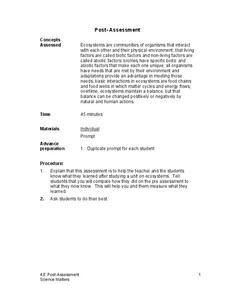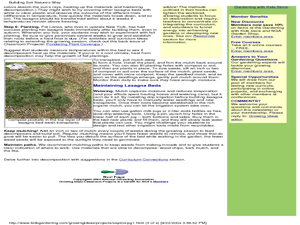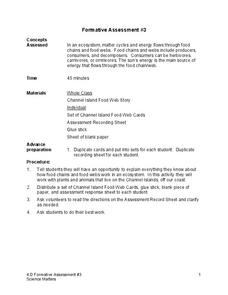Curated OER
Solid Waste and Recycling
Students demonstrate effects of waste on environment and ways of reducing it, observe how much packaging goes into bag lunches each day, and survey their families to assess awareness levels and household recycling practices. Lessons all...
Curated OER
Coal Science Fair Ideas
Learners select one of the ideas for a science project reflecting their knowledge about coal. They then choose a catchy title to spark interest that describes their project. They use the scientific method to explain the process.
BBC
Sound and Hearing
First and second graders recognize that sound is generated in a variety of ways, and that it comes from many different sources. They explore tone and volume, realizing that there are different ways to describe sound. Some musical...
BBC
Light and Shadows
Light is such an amazing thing! Elementary schoolers explore the wonderful world of light and shadow. The lesson is meant to be carried out on a whiteboard. Objects are placed in front of a light source, and learners must predict what...
BBC
Ourselves
Young biologists identify parts of the body, sort humans from other animals, and list the difference they see. Learners are split up into groups of three, and each group must find pictures in magazines of humans and other animals. They...
Curated OER
Can't Wait - Gotta Migrate:The Monarch Butterfly
Students study the migratory behavior of the monarch butterfly and to carefully develop a scientific method for answering one question concerning their behavior. They perform many meaningful tasks which help them explain the Monarch...
Columbus City Schools
Photosynthesis and Respiration
Thirty percent of the world's oxygen is produced by rainforests found throughout the world. Seventh grade learners explore the processes of photosynthesis and respiration through 10 days of labs, manipulatives, and discussions. They...
Curated OER
Food Chains
Learners take a look at the relationship between organisms in food chains, food webs, and energy pyramids. After an opening demonstration by the teacher, pupils are split up into groups. Each one is assigned an environment such as:...
Curated OER
Water Filtration
As an example of nature's water filtering system, young ecologists conduct an experiment in the lab. They construct a funnel out of a plastic bottle, fill it with specified layers of materials that simulate layers of soil, then run muddy...
Chicago Botanic Garden
Climate and Forest Ecosystem Services
Forests, through sequestration, capture excess carbon dioxide in our atmosphere and store it, aiding in climate change. The third installment in a four-part series on how climate impacts forests explores carbon sequestration. Classes...
Science Matters
Ecosystem Pre-Assessment
Test scholars' knowledge of ecosystems with a 20-question pre-assessment. Assessment challenges learners to answer multiple choice questions, read diagrams, and complete charts.
Science Matters
Post-Assessment
Twenty questions make up an assessment designed to test super scientists' knowledge of ecosystems. Scholars answer multiple-choice and short-answer questions about organisms, food chains, energy flow, and more.
Desert Museum
Daisy Ecology
Here's a fine lesson that combines poetry with life sciences. Learners carefully listen to a poem that's all about a food chain. As the poem is read, learners name the producer, the herbivore, the carnivore, and the omnivore. Lots of...
Curated OER
Amounts of Dissolved Oxygen in Various Bodies of Water
Students test water to determine the dissolved oxygen content while displaying the proper use of testing instruments while visiting water testing sites. They determine if the amount of dissolved oxygen is appropriate for the tested...
Curated OER
Building Soil Nature's Way: Exploring decomposition and soil health
Students explore decomposition and soil health by creating their own garden. In this agriculture lesson, students build a "lasagna garden" with organic matter found in the area and plant perennials native to their region. Students are...
Curated OER
School Forest
Sixth graders explore the concept of biodiversity. In this biodiversity lesson, 6th graders discover a variety of planets and animals that live in forests, and how a rotting log benefits that environment. Students also locate seven...
WK Kellogg Biological Station
Sounds of Selection
Do you want a creative and fun way to teach about natural selection? Hop to it by turning your middle school princes and princesses into frogs trying to catch as many bugs as possible in a Hungry Hungry Hippos style game. For high...
NOAA
A Laboratory Simulation of Ocean Surface Currents
Stimulate interest in ocean currents with a simulation. The first installment of a five-part middle school series teaches future oceanographers about the forces that interact to cause ocean currents. A simulation shows how wind and the...
EnLiST
Trap Your Own Insects: What’s in Your Backyard?
Young entomologists construct three types of insect traps—pitfall, pollinator, and panel—before setting their traps out and observing what they caught. They then observe what types of insects the different traps attract.
Tech Museum of Innovation
Seed Dispersal
Engineering challenges are not just man-made ... nature has its own set of them. A hands-on STEM activity has groups designing a seed dispersal system. Each group can only use one sheet of paper — a tough task!
Chicago Botanic Garden
Leaf Litter Ecology Lab
Some organisms spend their entire lives in leaf litter. The third in a series of six is a great lesson exploring the community of leaf litter. Groups gather and then spread leaf litter over white paper and remove leaves/twigs while...
Science Matters
Formative Assessment #3
Thirteen short-answer questions follow a brief food web activity in a formative assessment designed to test knowledge of ecosystems and the energy that flows through them.
Howard Hughes Medical Institute
Viral Lysis and Budding
How do some viruses spread so quickly, and why do they make us feel terrible? Answer these (and many more) questions through a simple yet impactful lessons. Pupils observe demonstrations that show the two methods viruses use to escape...
American Museum of Natural History
Be a Water Saver
Everyone must do their part to make a difference. The lesson link provides an 11-item questionnaire to reflect on conservation practices. Simple and straightforward, the lesson is perfect as a remote learning resource or as a tool for an...
Other popular searches
- Life Cycle of a Plant
- Plant Animal Life Cycles
- Plant Lifecycle
- Life Cycle of Plant
- "Life Cycle" Plant
- Plant, Animal Life Cycles
- Life Cycle Plant
- Life Cycle Bean Plant
- Life Cycle Flowering Plant
- Life Cycle of a Bean Plant
- Science Life Cycle of a Plant
- Life Cycles of a Plant

























